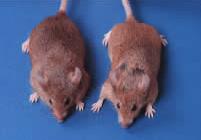
Researchers breed permanently “happy” mice
Aug. 24, 2006Courtesy McGill Universityand World Science staff
A new breed of permanently “cheerful” mouse is providing new hope for treatment of clinical depression, researchers say.
The scientists studied a gene called TREK-1, which can affect the flow of a brain chemical called serotonin. This in turn influences mood, sleep and sexuality. By breeding mice without TREK-1, the researchers said they created a depression-resistant strain.
The findings appear in the research journal Nature Neuroscience this week.“Depression is a devastating illness, which affects around 10 percent of people at some point in their life,” said Guy Debonnel of McGill University in Montreal, Canada, principal author of the paper. Current treatments fail for a third of patients, he added.Scientists also believe mice can suffer moods akin to human depression, evidenced by withdrawn and passive behavior in the rodents. Some of the same brain chemicals have been linked to both human and rodent “depression.”Debonnel’s team tested the newly bred mice using “behavioral, electrophysiological and biochemical measures known to gauge ‘depression’ in animals,” he said. “The results really surprised us. [They] acted as if they had been treated with antidepressants for at least three weeks.” The research represents the first time depression has been eliminated by genetically modifying an organism, he added. “The discovery of a link between TREK-1 and depression could ultimately lead to the development of a new generation of antidepressant drugs.”
*****************
I remember back in the day when people thought that moods and attitudes were related directly to soul qualities. I remember the day when you could look at a bright and shining personality and remark about how extraordinarily keen and well adapted that person is, as if the factors relating to that perky well-adaptedness were 100% related to personal life choices, up-bringing, outlook, angelic vs. demon posession or any number of metaphysical explanations. And now we learn that if we tweak a few amino acids here and there in a chain of code, we can make everyone a bright and shining soul- or a monster for that matter. Is there any room left for a soul?
The peculiar thing about the debate this question raises is that, regardless what your answer is- soul or no soul, we can ultimately attribute our entire cognitive and feeling experience to physical elements which we arguably have no control over.
On a personal note, when I reached the age of thirty, and decided that after 15 years of devoting my every waking minute and thought to the question of spirituality, to the search for meaning, to meditation, purpose, the edification of the soul, to studying the mind and the brain and science and people and intentions, and the stark reality of human nature - only to have to come to the conclusion that my entire life had been a lie, a deception, an empty fleeing from the pain of the brutally obvious; My entire pursuit of God, of transcendence, a soul, an immortal essence that I could call "real" and "eternal" and "true" collapsed only to be forced kicking and screaming with gut-wrenching reluctance to admit that my 30 years of existence provided no evidence whatsoever of any hint of free-will on my part, but just a dreamy sleep-walk through a hall of smoke and mirrors choosing at best between one illusion and another.
It's fascinating that the mice are conscious and feeling creatures with analogous nerve structures and behaviors to people, despite such tiny brains. They are neurologically geared to be capable of feeling severe torment and pain- little units of consciousness coralled in a lab for study, with no god to deliver them into the land of Canaan. It makes you wonder whose cage we're in and for what reason if not none.

No comments:
Post a Comment